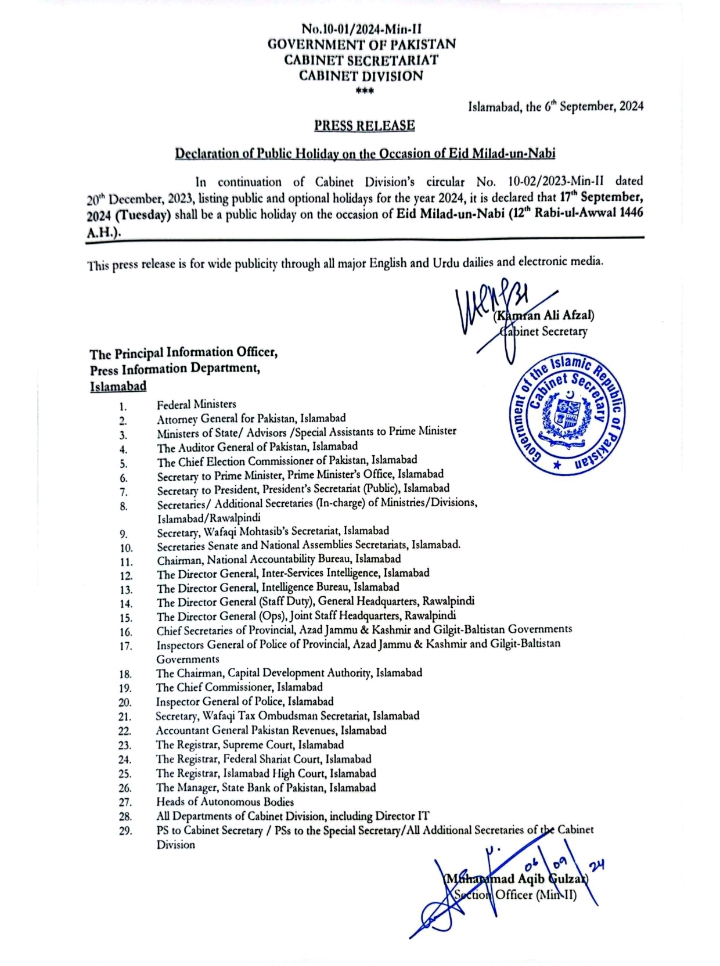Eid Milad-un-Nabi (12th Rabi-ul-Awwal, 1446 AH) Declared Public Holiday in Punjab, Pakistan
Introduction
The Government of Punjab, Pakistan, has announced a public holiday on September 17, 2024, to commemorate the birth of the Prophet Muhammad (PBUH). This holiday, known as Eid Milad-un-Nabi, is observed by Muslims worldwide to celebrate the life and teachings of their beloved prophet.
Key Points
- Date: September 17, 2024 (Tuesday)
- Occasion: Eid Milad-un-Nabi (12th Rabi-ul-Awwal, 1446 AH)
- Purpose: To celebrate the birth of Prophet Muhammad (PBUH)
- Scope: The holiday will be observed throughout the Punjab province.
Public Holiday Notification
The notification regarding the public holiday was issued by the Services and General Administration Department (Welfare Wing) of the Government of Punjab. It stated that the decision to declare the holiday was made in accordance with the Cabinet Division’s circular No. 10-1/2024-Min-II dated September 6, 2024.
Publicity and Dissemination
The notification will be widely publicized through both electronic and print media, including major English and Urdu dailies at national and regional levels. This will ensure that all citizens are aware of the public holiday and can plan their activities accordingly.
Impact of the Holiday
The declaration of a public holiday on Eid Milad-un-Nabi will have a significant impact on various aspects of life in Punjab. Schools, colleges, and universities will remain closed, and government offices will observe a holiday. Many businesses and private organizations may also choose to close for the day.
FAQs
- When is Eid Milad-un-Nabi observed?
- Eid Milad-un-Nabi is observed on the 12th of Rabi-ul-Awwal, the third month of the Islamic lunar calendar.
- Why is Eid Milad-un-Nabi celebrated?
- Eid Milad-un-Nabi is celebrated to commemorate the birth of Prophet Muhammad (PBUH), who is considered the most revered figure in Islam.
- What activities are typically held on Eid Milad-un-Nabi?
- Muslims often hold religious gatherings, prayers, and processions to celebrate Eid Milad-un-Nabi. Some may also decorate their homes and communities.
Conclusion
The declaration of a public holiday on Eid Milad-un-Nabi in Punjab, Pakistan, is a significant event for the Muslim community in the province. It provides an opportunity for Muslims to reflect on the life and teachings of Prophet Muhammad (PBUH) and to celebrate his birth.

Public Holiday on Eid Milad-un-Nabi
Introduction
The Government of Pakistan has declared a public holiday on September 17, 2024, to commemorate the birth of the Prophet Muhammad (PBUH). This decision is in line with the Cabinet Division’s circular issued on December 20, 2023, which outlined the public and optional holidays for the year 2024.
Key Points
- Date: September 17, 2024 (Tuesday)
- Occasion: Eid Milad-un-Nabi (12th Rabi-ul-Awwal 1446 A.H.)
- Purpose: To celebrate the birth of the Prophet Muhammad (PBUH)
- Announcement: The declaration was made through a press release issued by the Cabinet Secretary
Impact
The public holiday will affect government offices, educational institutions, and businesses across Pakistan. It is expected to provide an opportunity for people to celebrate the occasion with religious and cultural activities.
FAQs
- What is Eid Milad-un-Nabi?
- It is a religious festival celebrated by Muslims worldwide to commemorate the birth of the Prophet Muhammad (PBUH).
- When is Eid Milad-un-Nabi celebrated in 2024?
- September 17, 2024.
- Is it a mandatory holiday?
- Yes, it is a public holiday, which means all government offices, educational institutions, and businesses will be closed on this day.
Conclusion
The declaration of a public holiday on Eid Milad-un-Nabi is a significant event in Pakistan. It provides an opportunity for Muslims to celebrate the birth of their Prophet and strengthen their faith. The holiday also contributes to the cultural and religious diversity of the country.
